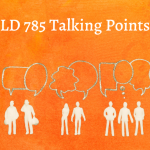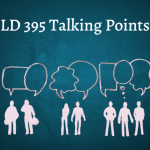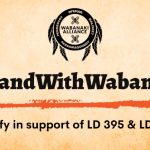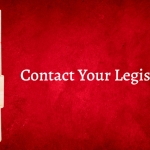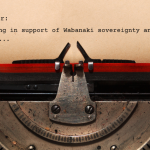The December Wabanaki Voices column was written by Maulian Bryant, a citizen of the Penobscot Nation and executive director of the Wabanaki Alliance. Wabanaki voices is a monthly column in the Bangor Daily News opinion section that shares tribal perspectives. Read all Wabanaki Voices columns here.
Dec. 10 is Human Rights Day, a commemoration of the United Nations Universal Declaration of Human Rights signed in 1948. This proclamation addresses the most basic facets of protecting humanity regardless of our background, country, race or religion. When considering world events it is worth pondering how well the global community is living up to these ideals and guarantees. The Wabanaki Alliance wishes to acknowledge this important date in history with a spotlight on some of our recent work regarding the crisis of missing and murdered Indigenous women and people. We have a right to be safe and heard in our homelands.
I was invited to testify before a U.S. House Appropriations Subcommittee (Interior and Environment) chaired by Republican Rep. Mike Simpson of Idaho and Maine’s Rep. Chellie Pingree, who serves as the ranking Democrat. On the panel with me were Indigenous women from around the country speaking to this issue with a powerful mix of data and facts, emotion, personal connection, knowledge, and pointed advice for how the U.S. government can help our nations in the face of this continued trauma and violence. I would recommend watching the entire hearing and discussion to get a deeper understanding of the impact of this crisis.
This will forever be one of the most formative and impactful days of my career in this heavy work I am so honored to do. I extend gratitude to the Wabanaki Alliance and all the tribal people who trust me to bring these words and ancestors into the halls of power. It is a complicated and important thing to do. Sitting there with four of my sisters in a room we were not meant to be in felt like healing slowly from a deep cut. These systems were built to silence our people in a sophisticated and nearly successful effort by the U.S. government to end our existence as tribal nations. Here we are, representing our people in a place where laws were made to take our land, take our children, outlaw our religion and diminish our humanity. It is powerful to be heard there and also heavy with the pain of generations.
Below is an excerpt from my testimony. We invite you to think about Human Rights Day as it relates to all humans:
“I am a mother to three daughters. Iris who is 2, Layla who is 15, and Carmella who just turned 18. Thinking about their safety and wellbeing has driven much of my work and advocacy on the issue of missing and murdered Indigenous women and people. One in three Indigenous women will be the victim of a violent crime in her lifetime. There are four of us in my immediate family.
“The societal component of this crisis, and why it has been so hard to combat and address, cannot be overlooked. When I was young and saw the Walt Disney movie Peter Pan it was the first time I can recall seeing stereotypes about my people. The ‘Indian Encampment’ scene and the use of the stereotypes around tribal women are a sad example. Tiger Lily, the Indian Princess, is no doubt a child yet made to look older and exotic and tempting. The older woman in camp is brash and mean and called a racial slur.
“Even the Disney version of Pocahontas gets it wrong. Pocahontas was likely 14 when she met the English soldiers. She was taken to Europe where she died of disease away from her family, culture and homelands. Both of these stereotypes have broadly applicable implications.
“A lot of our experience as real Indigenous women through the generations has been minimized while Americans embraced these false creations of us instead of seeing us as real people.
“When an Indigenous woman goes missing there is not the same attention and action as when a caucasian woman does. The primary reasons for this are three-fold: societal indifference, jurisdictional and coordination issues, and a lack of resources for tribal law enforcement agencies.
“The false conceptions of our people often lead to victim blaming and attitudes that minimize attention given to missing and murdered indigenous people cases and can lead to victim blaming. If an Indigenous woman was missing from a bar or a boyfriend’s home or if she has addiction issues or family issues she is often seen as putting herself in harm’s way and she is seen as the problem.
“It is a fact that lots of negative behaviors and dysfunction are a lasting consequence of the horrors inflicted on our people in the colonization of this country be it the land theft, pandemics, residential school policy, outlawing of our religion, etc. We are real people deserving of equal rights and treatment.”
On this International Human Rights Day please keep in mind the rights of the Wabanaki Nations in our homelands now called Maine. Supporting the recognition of our inherent tribal sovereignty and self-determination helps us all in many ways, and it is an important step toward increased safety and well-being for our people.



